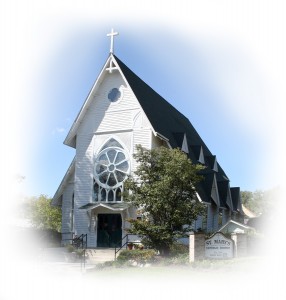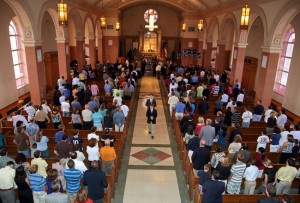 I concluded my last blog on the New Evangelization (NE) noting that I believe parish NE committees are an indication of a larger process of the institutionalization of the NE in the Archdiocese of Detroit (AOD), even though only 35% of parishes currently have one. I also concluded that if the Church wants its members to know about the NE then developing parish NE committees is an effective method for getting the word out. Continue reading
I concluded my last blog on the New Evangelization (NE) noting that I believe parish NE committees are an indication of a larger process of the institutionalization of the NE in the Archdiocese of Detroit (AOD), even though only 35% of parishes currently have one. I also concluded that if the Church wants its members to know about the NE then developing parish NE committees is an effective method for getting the word out. Continue reading
Category Archives: First Tags
A Beautiful Comment
I love it when reader comments add elegance and beauty to the conversation. Here’s a great example:
“Nice article. Sisters deserve so much respect for the sacrifices they have made in choosing this vocation. I always know for any crisis in life they have been there in prayer just a phone call away for me. I hope we never forget their importance in the catholic church; educators, nurses, doctors, missionaries, and even when they’re elderly they keep us lifted in prayer.”
This comment made me think of Sister Olga, my second grade teacher at St. Alphonsus Parish (the Church pictured above) and all of the other sisters who have been there and supported me throughout my life. Their impact is real.
Question: Pastoral Letters
The final stages of dissertation writing, as it turns out, are not conducive to a prolific blogging career. I do hope to have two posts up soon– one about voucher initiatives across the country and another about an excellent new book on parish closures.
However, I am writing today with a shameless plea. In the course of my continuing research I have developed a question that seemed like it might be best answered by the Catholic Conversation’s readership.
If one were to be interested in tracking down all the pastoral letters ever written about Catholic education [or any other topic for that matter] in the United States… where might the best place to look be?
Habits in the News: The Power of Image
Last week, the Vatican’s Congregation for Doctrine of the Faith released the results of its on-going doctrinal assessment of the Leadership Conference of Women Religious (LCWR), the larger of two umbrella organizations representing the majority of women religious in the U.S. Since then, the story has been picked up by hundreds of media outlets across the U.S. and abroad, and these stories have already led to campaigns in support of LCWR sisters. Many others have discussed and will continue to discuss the details of the Vatican’s recent decision to reprimand the largest leadership organization of women religious in the United States. The substance of this story is surely important to readers of “The Catholic Conversation,” but I have been especially fascinated by the pictures and images that accompany these news stories. Continue reading
Back in Action
Sorry, I’ve been away traveling and the blog has been relatively silent as a result. However, I am back and we should have posts up soon. I’m looking forward to a post (or two or three) discussing the LCWR situation from a sociological viewpoint. We are also hoping to have a post on school vouchers and their consequences for Catholic school enrollment, and much more this month. Finally, I’ve gotten some passionate comments from readers that I want to include in our conversation (along with responses), so look for all of that coming soon to The Catholic Conversation.
Redefining the Public Discourse at the Local Level: A Look at Two Catholic Parishes and their Attempts to Define Church Discourse
 I am currently working on a Master’s Thesis project at Loyola University Chicago examining parish cultures around politics. The study focuses on two ethnographies in the Archdiocese of Chicago[1] – 1) an ethnography of St. Mary Magdalene Parish, a self proclaimed social justice parish with a collective narrative of “All are Welcome,” and 2) St. Pius Parish, an active parish in the Archdiocese working on issues regarding respect for life. A finding I am currently working through is an unexpected focus at both of the parishes on human sexuality. Continue reading
I am currently working on a Master’s Thesis project at Loyola University Chicago examining parish cultures around politics. The study focuses on two ethnographies in the Archdiocese of Chicago[1] – 1) an ethnography of St. Mary Magdalene Parish, a self proclaimed social justice parish with a collective narrative of “All are Welcome,” and 2) St. Pius Parish, an active parish in the Archdiocese working on issues regarding respect for life. A finding I am currently working through is an unexpected focus at both of the parishes on human sexuality. Continue reading
“Intentionality” as a Growing Trend in Parish Ministry
As a pastoral planner and researcher for the Diocese of Cleveland, I spend a lot of time tracking ministry trends. One that has my attention at the moment is the degree to which parishes are becoming more intentional, organized and participative in their consultation and ministries.
This movement toward intentionality can be seen through a number of indicators, specifically the increasing use of mission statements, parish pastoral councils, and pastoral planning by parishes, as well as the broadening of consultation with the laity in the exercise of parish leadership.
Continue reading
A Reader Joins the Conversation
A reader responds with a critical but honest reaction:
“There are terms used in the blog that I find out of place for my experience. In the article about “liberal” Catholics and contraception, it frequently uses the term “liberal” in a pejorative manner. I find the word “liberal” does not fit. At one point, it states, “liberal Catholic elites” and then names two Catholics. Do you use terms like “conservative” or “conservative elites”? Even if you did, it would not add balance to it; rather, it would polarize it further. It would further adopt the elected-political terms into the life of the Church where I find they incite rather than bring understanding.” Continue reading
Tell me what you value and I’ll tell you where you worship: a parish typology based upon measures of importance
 In the past Catholics had little choice in their parish: most attended the parish within whose boundary they lived. If they belonged to an ethnic group which had a parish in the area, they were also free to register at that parish. While boundaries still officially exist, their importance generally has been downplayed by church officials during the last 30 years. Many Catholics choose their parish from among the Catholic parishes available in their area. In many ways the expectation of being able to choose one’s own parish is taken for granted, like the expectation of being able to choose one’s bank or physician. Continue reading
In the past Catholics had little choice in their parish: most attended the parish within whose boundary they lived. If they belonged to an ethnic group which had a parish in the area, they were also free to register at that parish. While boundaries still officially exist, their importance generally has been downplayed by church officials during the last 30 years. Many Catholics choose their parish from among the Catholic parishes available in their area. In many ways the expectation of being able to choose one’s own parish is taken for granted, like the expectation of being able to choose one’s bank or physician. Continue reading
Does the Cafeteria Ever Close?
 Everyone knows the phrase “cafeteria Catholics.” It is used pejoratively to categorize one way that Catholicism is lived: as a series of opinions that are picked willy-nilly based on the superficial feelings and unguided judgment of an individual.
Everyone knows the phrase “cafeteria Catholics.” It is used pejoratively to categorize one way that Catholicism is lived: as a series of opinions that are picked willy-nilly based on the superficial feelings and unguided judgment of an individual.
But does the cafeteria ever close? Are all American Catholics, in some way, “cafeteria Catholics”? This thought came to mind with the recent controversy over the denial of communion in Washington, DC. The priest who denied communion to a lesbian woman has issued a statement recounting the details of the incident as well as his rationale for acting the way he did. Continue reading


